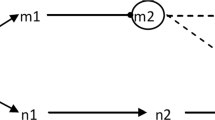Abstract
In this paper I describe basic features of traditional (British) emergentism and Popper’s emergentist theory of consciousness and compare them to the contemporary versions of emergentism present in connectionist approach in cognitive sciences. I argue that despite their similarities, the traditional form, as well as Popper’s theory belong to strong causal emergentism and yield radically different ontological consequences compared to the weaker, contemporary version present in cognitive science. Strong causal emergentism denies the causal closure of the physical domain and introduces genuine new mental causal powers and genuine downward causation, while weak emergentism provides new insights in understanding the mechanisms and explanation that is compatible with physicalism.
Similar content being viewed by others
References
Atherton, M. (1994), Women Philosophers of the Early Modern Period, Hackett Publishing Company, Indianopolis/Cambridge.
Bechtel, W., Abrahamsen, A. (2002), Connectionism and the Mind, Blackwell, Oxford.
Bickle, J. (1998), Psychoneural Reduction: The New Wave, MIT Press, Cambridge.
Broad, C.D. (1960), The Mind and its Place in nature, Littlefield, Adams & CO., Paterson, New Jersey.
Caston, V. (1997), “Epiphenomenalism, Ancient and Modern”, The Philosophical Review, p. 309–363.
Clark, A. (1990), “Connectionism, Competence, and Explanation”, in M. Boden (ed.), The Philosophy of Artificial Intelligence, Oxford University Press.
Crane, T. (2001a), Elements of mind: An Introduction to the Philosophy of Mind, Oxford University Press, Oxford.
Crane, T. (2001b), “The Significance of Emergence,” in Carl Gillett and Barry Loewer (eds.), Physicalism and Its Discontents, Cambridge University Press, Cambridge. p. 207–224.
Gillet, C. (2002), “The Varieties of Emergence: Their Purposes, Obligations and Importance”, Grazer Philosophishe Studien, vol.65, p. 95–121.
Gregory, R. (1981), Mind in Science, Penguine books.
Hanson, S.J., Burr, D. (1990), “What connectionist models learn: Learning and representation in connectionist networks”, Behavioral and Brain Sciences 13, p. 471–518.
Hasker, W. (1999), The Emergent Self, Cornell University Press, Ithaca and London.
Hooker, C. (1981), “Towards a General Theory of Reduction I, II, III”, Dialogue.
Horgan, T. (2001), “Causal Compatibalism and the Exclusion Problem?”, Theoria, Vol. 16/1, No. 40, p. 95–116.
Kim, J. (1993), Supervenience and Mind: Selected Philosophical Essays, Cambridge University Press, Cambridge.
Kim, J. (1998), Mind in a Physical World. MIT Press, Cambridge.
Markič, O. (1999), “Strict and loose emergentism”. In U. Maixner, P. Simon (ur.), Mataphisics in the post-metaphisical age: papers of the 22. International Wittgenstein Symposium, August 15–21, 1999. Kirchberg am Wechsel, Vol.7/12, p. 29–34.
Markič, O. (2002), “Nonreductive materialism and the problem of causal exclusion”, Grazer Philosophishe Studien, vol.63, p. 79–88.
Markič, O. (2004), “Crane on the Mind-Body Problem and Emergence”, Croatian Journal of Philosophy, Vol. 4, No. 11, p. 199–205.
McLaughlin, B. (1992), “The Rise and Fall of British Emergentism”, in A. Beckermann, H. Flohr, J. Kim (ed.) Emergence or Reduction? Berlin, New York: Walter de Gruyter.
O’Connor, T. (1994), “Emergent properties”, American Philosophical Quarterly, Vol. 31, No. 2, p. 91–104.
Popper, K., Eccles (1977), The Self and its Brain, Springer, New York.
Ryle, G. (1949/1978), The Concept of Mind, Penguin Books.
Smolensky, P. (1988), “On the Proper Treatment of Connectionism”, Behavioral and Brain Sciences 11, p. 1–74.
Stephan, A. (1992), “A systematic View on its Historical Facets”, in A. Beckermann, H. Flohr, J. Kim (ed.) Emergence or Reduction? Walter de Gruyter, Berlin, New York.
Stephan, A. (2002), “Emergentism, Irreducibility, and Downward causation”, Grazer Philosophishe Studien, vol.65, p. 77–93.
Van Gulick, R. (2001). “Reduction, Emergence and Other Recent Options on the Mind/Body Problem”. Journal of Consciousness Studies, 8, No. 9–10, p. 1–34.
Wimsatt, W. (1997), “Aggregativity: Reductive Heuristic for Finding Emergence”, Philosophy of Science, 64: S337-S384.
Author information
Authors and Affiliations
Rights and permissions
About this article
Cite this article
Markič, O. Causal emergentism. Acta Anal 19, 65–81 (2004). https://doi.org/10.1007/s12136-004-1013-8
Received:
Issue Date:
DOI: https://doi.org/10.1007/s12136-004-1013-8




